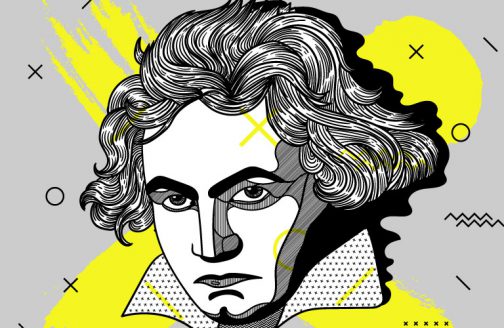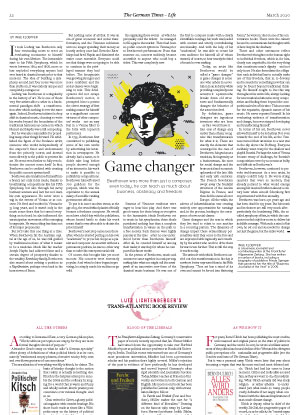Game changer
 Credit: Shutterstock.com/ iku4
Credit: Shutterstock.com/ iku4 Beethoven was more than just a composer; even today, he can teach us much about business, obstinacy and freedom
It took Ludwig van Beethoven only four resounding notes to erect an everlasting monument to himself during his own lifetime. The intractable start to his Fifth Symphony, which he wrote between 1804 and 1808, more or less exploded everything anyone had ever heard in classical music prior to that moment. The idea of building a symphony around just four notes was more than stubborn; it was entirely unique and completely outrageous.
Ludwig van Beethoven is a singularity in the history of art. He is one of those very few artists able to usher in a fundamental paradigm shift – a transformation after which nothing is ever the same again. Indeed, Beethoven initiated a deep shift in classical music, choosing to write his works beyond the boundaries of the traditional harmonious cosmos in which Mozart and Haydn were still composing.
But he was also responsible for propelling many other things forward. He established the figure of the freelance artist; someone who works independently of the emperor’s favor and endowments from the princely courts, and instead turns directly to the public to present his art. He went even further to fully revolutionize the concert scene itself. In fact, Beethoven can be credited with creating the public concert system itself.
Beethoven also transformed himself into a brand, not only in his music, thanks to breathtaking compositions like his Fifth Symphony, but also through his savvy business acumen and, last but not least, his own appearance. He never wore a wig in the streets of Vienna or at concerts. He lived and worked in Vienna for 35 long years, and it wasn’t only in the music scene there that he turned everything on its head; he also influenced the emancipation movement of the emerging bourgeoisie. He was nothing less than one of its major proponents.
But let’s take this one thing at a time. When Beethoven hit the Austrian capital at the age of 22, he was still guided by traditional notions of what it meant to be a musician. Much like his teacher Joseph Haydn had achieved fame and a certain degree of prosperity thanks to the wealthy Esterházy family, Beethoven also mused about seeking a position as a Kapellmeister, perhaps even back in his hometown of Bonn.
But nothing came of all that. It was an era of great economic and social transformation, and the Viennese noblemen were no longer spending their money as loosely as they once had. Even the Esterházys had fired Haydn and dismissed the entire court ensemble. Everyone could see that things were not going to be able to continue in the privileged manner they had before. The bourgeoisie was growing stronger and more confident and the social classes were beginning to mix. This development did not escape Beethoven’s notice; it prompted him to pursue the clever strategy of first making a name for himself as a magnificent concert virtuoso of other composers’ works – not an easy feat in a Vienna filled to the brim with topnotch performers.
In 1795, Beethoven first committed to publishing some of his own works by advertising his intention in newspapers. He already had a name, so it didn’t take long before people showed enough of an interest in his work to make it possible to publish his compositions. Beethoven himself raised 700 guilders for the purpose, which was the equivalent to the annual salary of a middle-ranking government official.
To put it in more modern terms, at the age of 25, the wunderkind pianist officially became a freelance composer. He would soon have a field day with the publishers, whose heated battle to claim his work meant that he was often able to dictate the price himself.
Beethoven’s next step came soon thereafter, when he started putting on his own “academies” to prove his chops as a pianist and composer. As an artist without a permanent position, he saw no other way than to take this entrepreneurial risk.
Of course, this brought him yet more success. His concerts were extremely popular. And when he later began improvising, he simply made his audiences go wild.
By organizing these events – at which he personally sold the tickets – he managed to fill a gap in the market. There had been no public concert system in Vienna prior to Beethoven’s performances. From that moment on, concerts suddenly became accessible to anyone who could buy a ticket. This was completely new.
Swarms of Viennese residents were eager to hear him play. And there was good reason for them being so receptive to the humanistic ideals Beethoven set to music in his symphonies; these ideals postulated nothing less than a complete transformation in values on the path to a free society. Such themes were highly popular at the time – a fact no one understood better than Beethoven himself. After all, he counted himself as among their ranks; it was they for whom he composed his finest works.
In the person of Beethoven, music and commerce came together in a unique way, making him what one might call the avant-garde of an innovative new form of the classical music business. He was one of the first to compose music with a clearly identifiable message; his work was loaded with content and utterly overwhelming emotionality. And with the help of his “academies,” he was able to create his own audience for himself, all of whom wanted, of course, to hear exactly the kind of music he was making.
Today, an artist like Beethoven would be called a “game changer.” A game changer is someone who ushers in a revolution in an industry while providing completely new access to it – a person who breaks down old structures and fundamentally changes the behavior of the actors involved.
By definition, game changers are ingenious inventors who are born – as fate would have it – into eras of change and, earlier than others, recognize this transformation for what it is. These are exactly the elements that converged in the case of Beethoven: his genius as a musician, his ingenuity as a businessman, his nose for social change and the brute social and economic upheavals of the late 18th and early 19th centuries. The French Revolution swept away the feudalist structures of the Ancien Régime in France, and then did the same all over Europe. All the while, the advent of industrialization was creating entirely new opportunities for earnings and, in the process, leading to the emergence of new social classes.
Game changers and the eras in which they live tend to relate to one another in a recurring pattern. The dynamics of change impact these extraordinary personalities until they come to the fore and are expressed with ingenuity and creativity by the artists who work to drive them forward even further. This is still the way it works today.
The attitude with which Beethoven carried out this transformation in his day is nowhere better expressed than in his Fifth Symphony. “True art has a mind of its own and cannot be forced into flattering forms,” he wrote in 1820 in one of his conversation books. These were the cahiers he used to communicate his thoughts with others despite his deafness.
These and other utterances reflect Beethoven’s thoughts on the human right to individual freedom, which is, for him, clearly non-negotiable; it is the very thing that constitutes man’s dignity – and not only in art. He also formulates the obligation each individual has to actually make use of this freedom, that is, to develop and to search for something new that can only be found beyond traditional thinking. He himself sought to live this way throughout his entire life, always looking for new musical solutions in every composition and finding them beyond the compositional rules of his time. This accounts for the expansive, dynamic nature of his music. He never repeated himself. In his everlasting embrace of transformation and change, he never stopped developing and transforming himself.
In terms of his art, Beethoven never allowed himself to be led astray. Not even towards the end of his life, as the Viennese turned their attention to a new star in the sky above the Hofburg. Everyone suddenly went crazy for the shallow and playful Rossini. Perhaps the ears of Vienna became weary of challenge, for Rossini’s compositions were by no means as bulky and difficult as Beethoven’s.
Beethoven, however, continued to provoke stubbornness. As a true artist, he simply couldn’t help it. He wrote string quartets that were so modern, they already pointed to what would emerge among his musical brethren almost a century later when Arnold Schönberg first experimented with free atonality.
Beethoven was born 250 years ago and has been dead for 193 years. But his music and its themes are still very much alive – particularly the headstrong Fifth, the so-called symphony of fate, in which the composer needed only four notes to deliver his indelible message. With such a mind of his own, he set out and succeeded to change not just the game, but the entire world.
Inge Kloepfer
is a contributing writer at the Frankfurter Allgemeine Zeitung. She has written a number of books, including highly acclaimed biographies of conductor Kent Nagano and publisher Friede Springer. The latter earned her the honor of Business Journalist of the Year in 2005.




